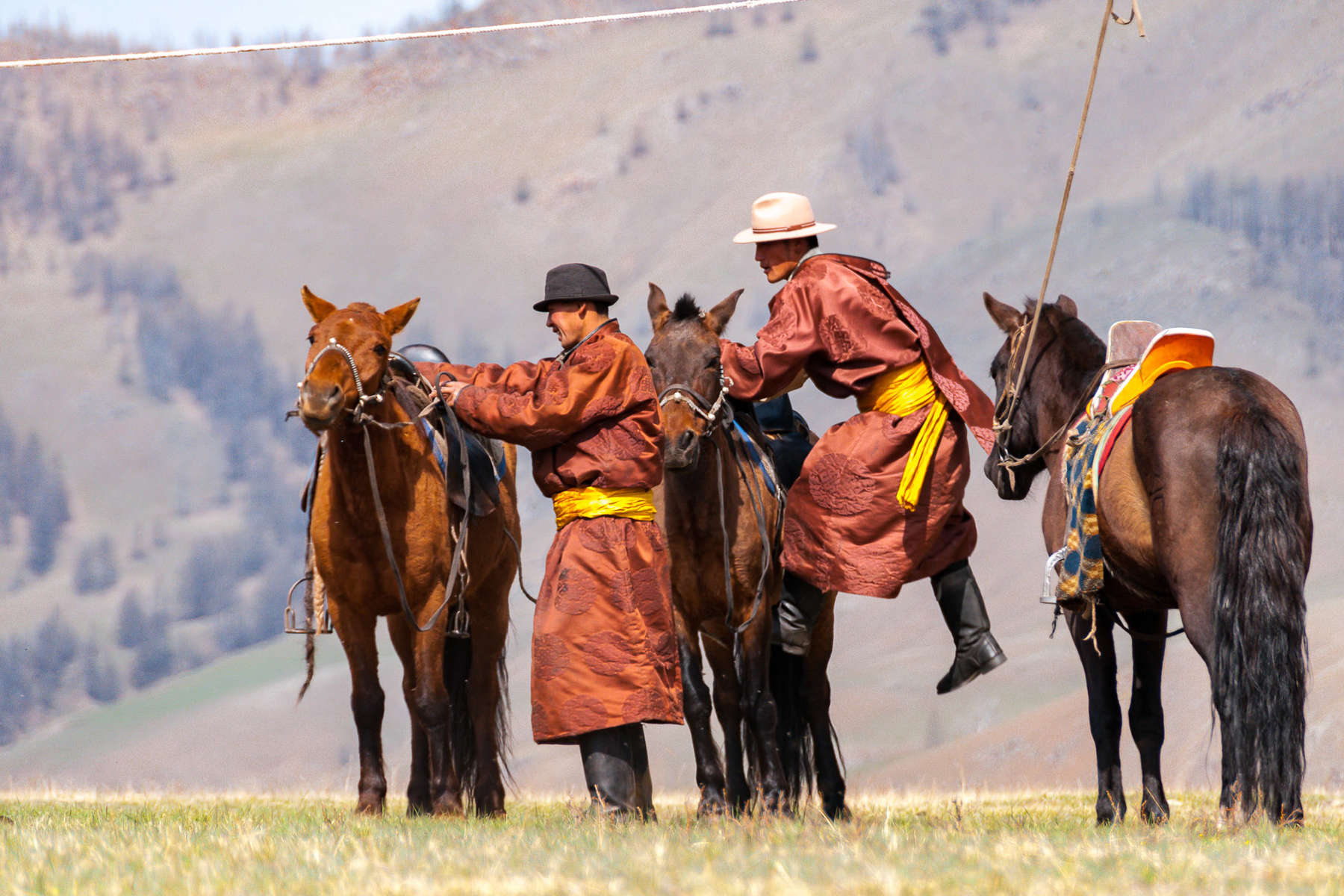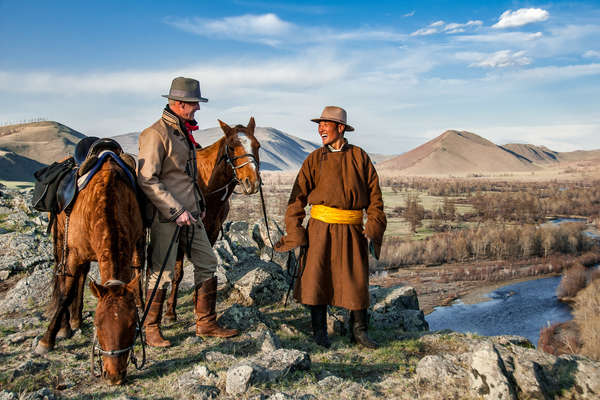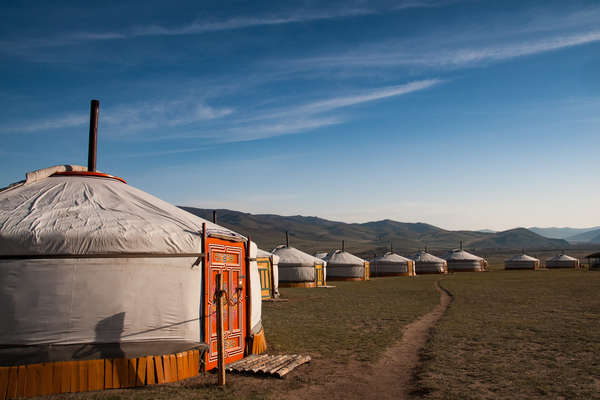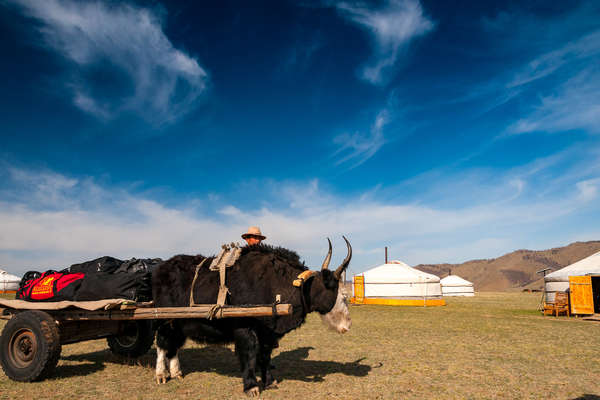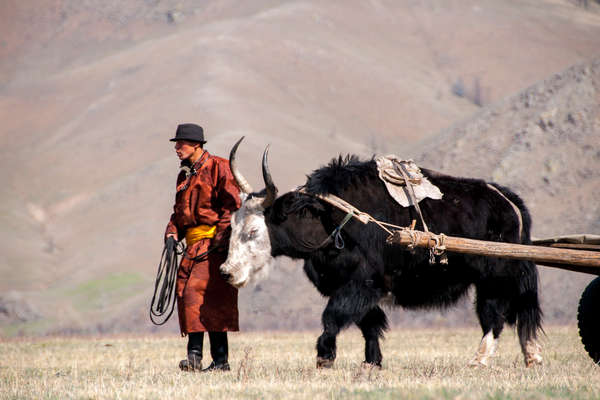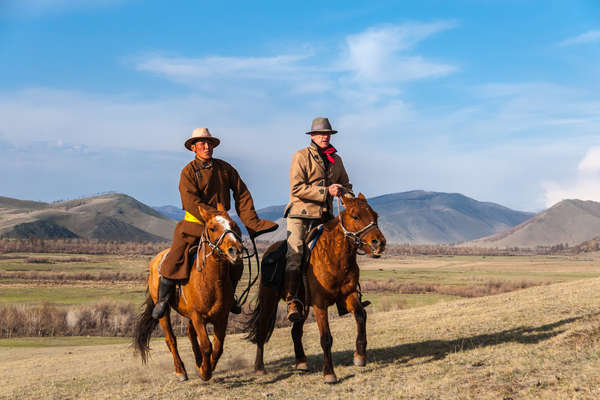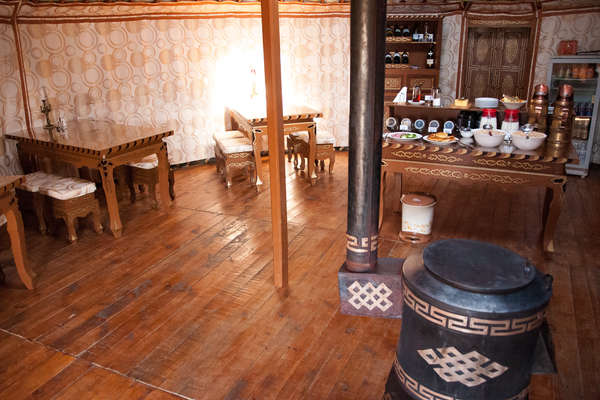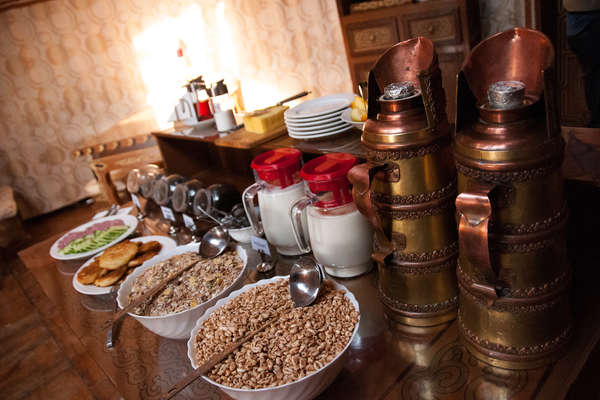Comfort
Whilst riding the route on horseback, you will stay in 2-3 person yurts with individual camp beds and mattresses. Bed linen provided. Your camp each night will also include: a mess yurt with wood-burning stove, table and chairs - a WC tent (compost toilet) - a shower tent (hot water available). Camp is moved every two days.
While at the Jalman Meadows camping ground, you will stay in 2-4 person yurts equipped with individual full bedding and a wood-burning stove. You will share a bathroom/ shower room - hot water is usually available. You will have your meals in a mess yurt on the campground. The camp also has a large library of books on Mongolian culture available to all visitors.
In Oulan Bator, you will stay in a 3* standard hotel in a double room with a private bathroom.
Meals
The food is simple, hearty and is usually made up of fresh local produce prepared by a cook who travels with you and will adapt the recipes to a more western palate. Evening meals (soup, main, dessert) are usually served around small camping tables with stools. At midday, you will have picnic lunches. Often the team will buy a sheep at some point throughout the ride to provide fresh meat for your meals. For breakfast, you will usually have fresh yoghurt bought from the herdsmen in the area.
Vegetarian diets can be accommodated with advance notice.
Water:
Do not to drink water from unknown sources. The cook will boil water each day for you to fill up your water bottles but you should also bring water-purification tablets such as Micropur.
Climate
Mongolia enjoys around 260 days of sun per year!! The majority of the country receives very little rainfall, a yearly average being around 200 - 350 mm in the north, an amount which decreases as you head further south. The country is located in the heart of a system of high pressure fronts (anticyclone) which means that the skies are often completely clear of clouds. In fact, there is only significant cloud cover during the summer which has led to the Mongolia sometimes being referred to as 'blue sky country'.
On the other hand, the country also plays host to a continental climate of extremes due to the country's geographical profile: vast semi-desert plateaus at an average altitude of over 1500 metres.
Winters are harsh and long (from October to April), with temperatures dropping to - 30° or -40°C in January and February. In the Gobi desert, it is not unusual to see snowfall up until April, and certain lakes remain frozen up until June; you will start to see the first signs of winter at around the end of September.
Summers in Mongolia are marked by a short rainy season, from mid-July to September, characterised by rain spells that are light and brief and generally take place at the end of the day. Temperatures are mild in the north of the country and extremely hot in the Gobi desert in the south. Due to the high altitude, the evenings are cool, even in the summer months.
Winds are often strong, especially during the short spring, where they also bring with them sand storms. On top of this, the changes in weather can be vast and sudden. The temperature differences between day and night are often significant; it is not unheard of, in spring and autumn, to pass from - 5°C at the beginning of the day to + 30°C at noon.
The country also experiences dzud or zud, a Mongolian term for a severe winter; a white dzud signals heavy snowfall which impedes access to the grazing pastures for the livestock and a black dzud means that a lack of snowfall and freezing temperatures create a drought and the livestock suffer from dehydration.
Depending on the region of Mongolia you are choosing to visit, the best time to travel there is between May and the end of September.
Tips
Tipping is always welcome if you are happy with the services provided to you by the local guides and drivers. Any tip given should be in line with the cost of living in the country. For Mongolia, you could factor in a tip of around £30 - 40. Tipping remains completely at your discretion.
Packing list
- A riding helmet is compulsory and we recommend that you take your own to ensure a correct fit. Helmet makers (GPA, HKM, LAS Helmets, Lamicell, Troxel, Equithème) now offer horse-riding helmets that are ventilated, strong, light and comfortable.
- Sunhat for when not riding
- Sunglasses - with a cord attached so they don't fly off when riding
- Buff or bandana for protecting your neck and face from the sun, wind or rain
- Warm hat for cold evenings/days
- Waterproof hood or cagoul
Upper body
- Thermals in case of cold weather
- Long sleeved shirts provide protection from the sun or extra warmth
- Down jacket or gilet for cold evenings
- T-shirts
- Lightweight fleece or jumper
- Warm polar fleece or equivalent (plus a spare in case one gets wet)
- Waterproof jacket - rain can be difficult to predict and it's better to be prepared. In the mountains the weather can change quickly
Legs
- 2 pairs of lightweight, comfortable riding trousers or jodhpurs - we recommend riding in them at home before taking them on holiday to ensure they don't rub
- Waterproof over trousers
- Casual clothes for the evenings (jeans or walking trousers)
- Thermal trousers for cold days or for sleeping in
- A swimming costume may be useful for impromptu dips in the lake and washing in the river
- Non-irritant cotton or synthetic underwear
Hands and Feet
- Comfortable riding boots. We recommend short boots with half chaps but you may wish to take long chaps. We don't recommend taking your favourite long leather boots in case they get damaged
- One pair of waterproof shoes or boots (in case of rain and also for around the camp in the morning when the ground can often be damp)
- Lightweight shoes or trainers for the evenings
- Several pairs of warm socks
- Gloves - your hands are particularly exposed to the sun, wind or rain whilst riding
Horse riding extras
- Backpacks cannot be worn whilst riding. We recommend a small bumbag or a coat with pockets so that you can carry small items with you during the day (camera, sunscreen, lip balm etc)
- A soothing cream may be useful to treat areas irritated by long hours in the saddle
- Backpacks are not permitted whilst riding
- For riders measuring over 1m 90 (6ft 2in) we recommend that you bring your own pair of adjustable stirrups as the local stirrups, while adjustable, are often limited in terms of length
Night
- Warm pyjamas
- No need to bring a sleeping bag but we recommend you bring a sleeping bag liner for extra warmth.
Other useful items
- Water-purification tablets
- Water bottle (1.5 litres or 2 equivalent)
- Head torch or small torch for moving around at night - bring spare batteries and bulbs
- Toiletries
- Protein or cereal bars for the longer stretches of riding
- Toilet paper and a lighter to burn it after use
- Swiss army knife or equivalent (in checking-in luggage!!)
- Small plastic bags for you rubbish
- Ear plugs (may be useful)
- Camera and high capacity memory card. Spare battery
- A pair of binoculars
Medical kit
Make sure any allergies (to medication or otherwise) and clearly stated in your medical kit
- Any medication you regularly take
- Painkillers
- Imodium or similar anti-diarrhea medication
- Vitamin C tablets
- Sunscreen and lip balm - should be high factor
- Insect repellent
- Eye drops
- Hydrating/ soothing cream
- Plasters
- Blister plasters in case of any rubs
- Antiseptic cream, plasters, aspirin, anti-histamine, insect-bite salve etc..
- 10cm wide bandage
- Spare prescription glasses/contact lenses
- Re-hydration sachets
- Antiseptic wipes
- Hand wash gel
General information
- Throughout the ride, we ask you not to exceed 15kg of luggage per person so as not to over charge the yaks and logistics team responsible for carrying your luggage throughout the trip
- Travelling in your riding boots and carrying your hat and some riding clothes is highly recommended - then if your luggage goes astray you are still able to ride!
- We recommend taking a copy of your passport and insurance documents with you in case you lose your originals
- If, in wishing to 'travel light', you plan to wash your clothes throughout the trip, please ensure you bring biodegradable laundry products with which to do your washing
- Ensure you bring something for your chemical waste (batteries, aerosol cans, cream tubes, plastic wrapping), in order to take it back to the UK where recycling and waste disposal is done well and effectively. We advise to, wherever possible, avoid altogether bringing wrapped products to Mongolia. If you do, ensure you take them back to the UK with you
Equipment provided
- Medical kit
- 1 pair of medium saddlebags
- Yurt for 2 or 3 people with individual beds
- Full bedding
- Yurt mess tent
- Bathroom tent with a WC and a shower with hot water
- Bottled water
Suggestions
- We suggest taking with you some postcards of your hometown or photos of your family to show to your guides and team. You may also like to take out a present/ token for your hosts, Mongolians enjoy playing UNO, with foam balls, skipping ropes, pencil crayons, colouring books for the children and sample tubes of different creams.

